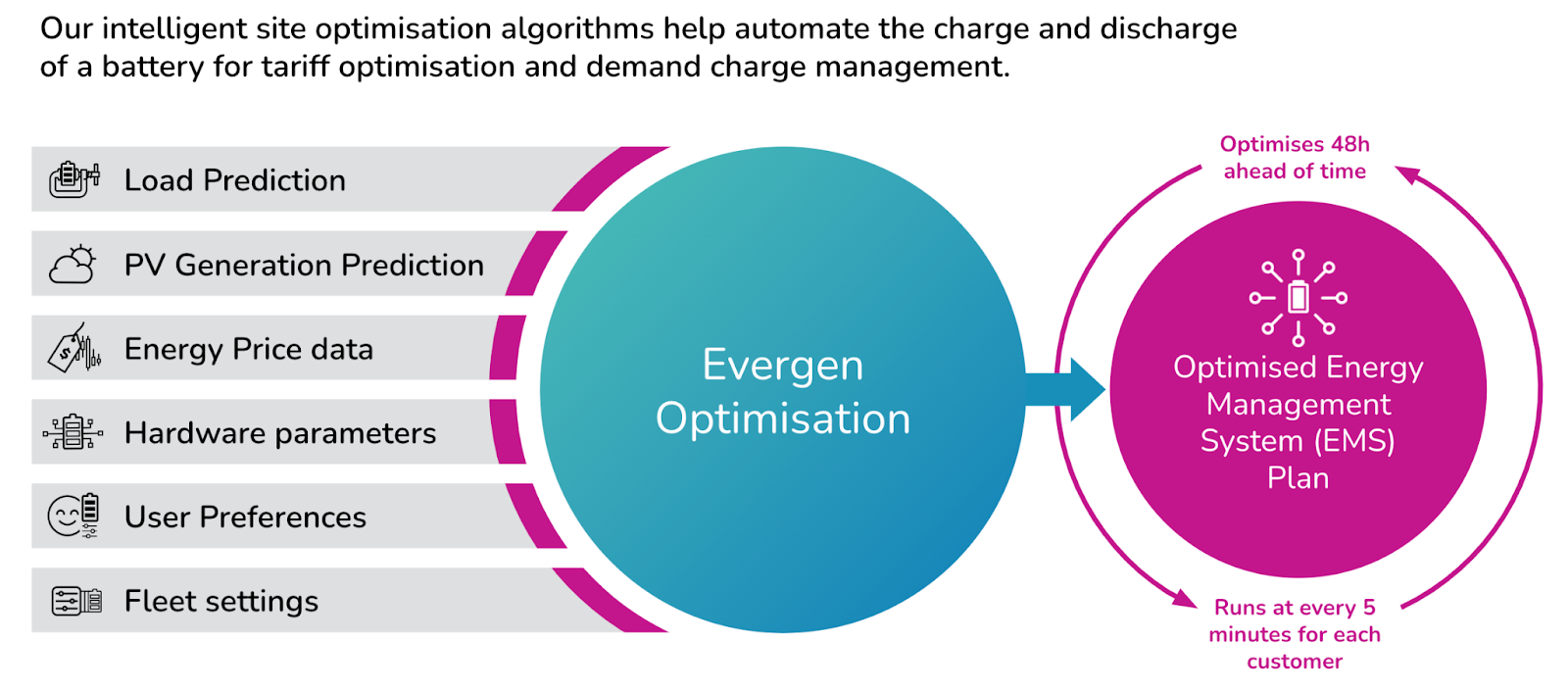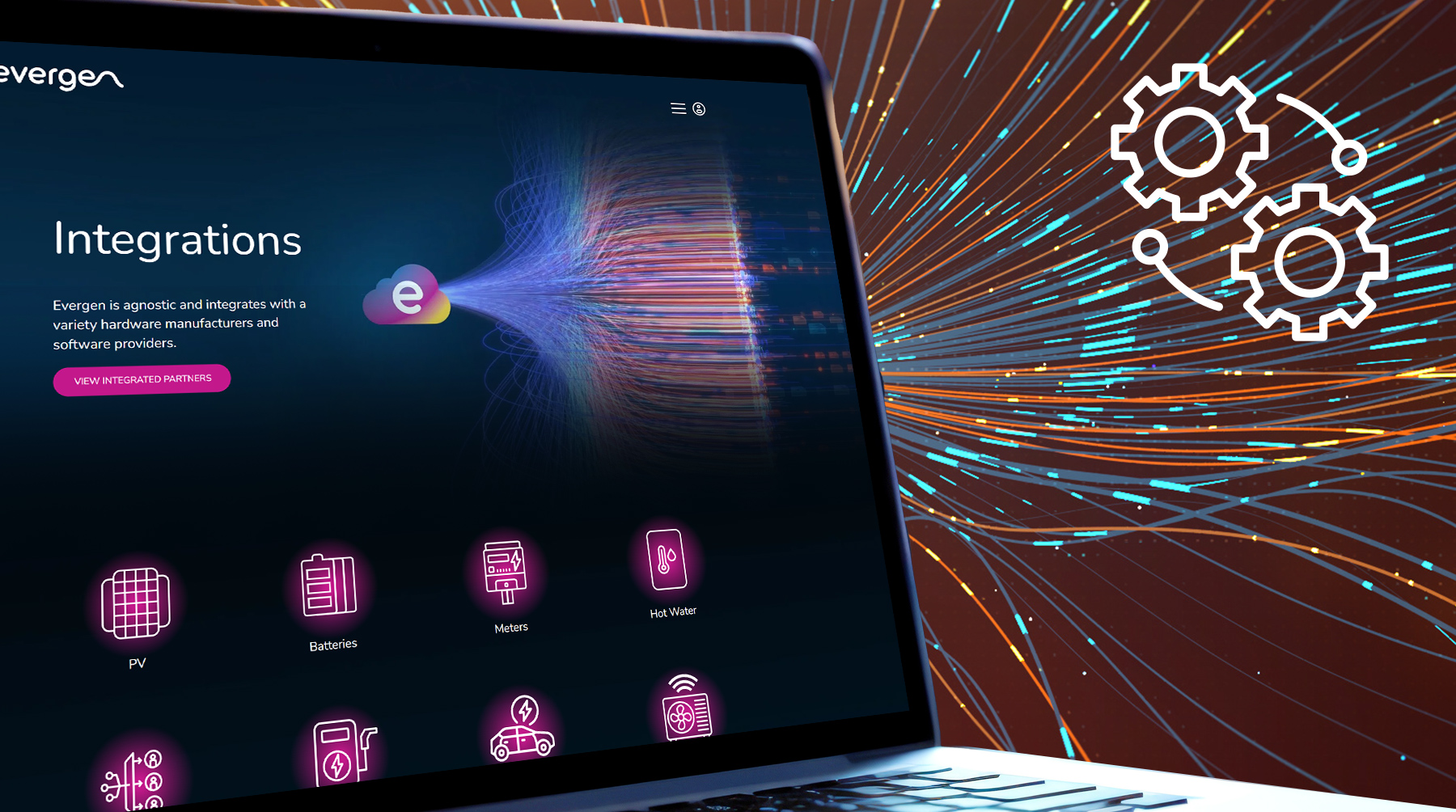Written by Helen Barlow, Data Scientist at Evergen
Batteries play a key part in the transition to a resilient, renewable energy system. As we make the move to solar and wind power, we need ways to keep the grid stable and ensure electricity is where it’s needed, when it’s needed. Integrating AI-driven optimisation technology into battery storage systems to create smart grids means the transport of electricity can be monitored and managed in ways that maximise performance, increase returns for end customers and contribute to a reliable and secure network.
At a residential level, a battery increases the use of solar power. It stores the excess energy produced during the day and once it’s full the excess energy goes back onto the grid. In the evening, when electricity demand and prices peak, the stored energy can be used, reducing the energy drawn from the grid and saving money.
Optimisation technology, like Evergen’s Intelligent Control (IC), can take this a step further. For example, on a cloudy day when any solar energy generated is quickly used, a battery operating under self-consumption mode may be empty when the sun goes down and power will be drawn from the grid. In contrast, if IC is controlling the battery, it will store the energy generated from the panels or even top up from the grid when prices are low. As a result, the house will be powered by energy from the grid while prices are cheaper during the day and use the battery when the price goes up in the evening.
Intelligent Control works by using machine intelligence to create a plan for battery charges and discharges, adapting the battery operation for the best outcome according to the customers’ needs. Our software uses historical data and weather forecasts to predict solar generation and energy consumption at each site, and determines the optimal behaviour for the battery. We send commands directly to the API of the battery or inverter – without the need for additional hardware. Evergen is hardware and retailer agnostic which means flexibility to provide the best solution at every level for each use case.

When buying a battery, homeowners are aiming for the best financial outcome and minimum payback time on their investment. Evergen customers save, on average, an additional 26.4%* off their electricity bills compared to an unoptimised solar and battery storage system. This translates to a reduction in the payback time of over 1 year for a typical Sydney site and almost 4 years for a typical Brisbane site**. Savings can increase even further when sites are exposed to the wholesale electricity market. During recent market volatility, the average monthly savings quadrupled as Intelligent Control took advantage of price surges to maximise revenues.
Intelligent Control is highly versatile. Besides energy arbitrage optimisation, it can be set to avoid demand charges, prevent the battery from dropping below a minimum state of charge, or reduce excess cycling to comply with warranty requirements and protect the longevity of the battery. Customers can track their battery behaviour through the customer portal and mobile app, as well as view their energy use, grid consumption and solar production.
Example
This site has a 14 kWh battery with a maximum power of 5 kW and a solar array that can generate 5 kW on a sunny day. The baseline load during the day is enough to drain the battery before peak hours in the evening.

With the optimisation, the battery keeps charging until it’s full and even tops up in the late afternoon to provide the energy required during the peak period. The end result is power being drawn from the grid during the day when costs are lower and from the battery when the prices are high.

Evergen technology can also harness behind-the-meter storage systems to create Virtual Power Plants (VPP – a group of distributed assets that work together to improve grid stability, provide network services and trade in the energy market. Our platform has an intuitive user interface that allows operators to view data on a whole fleet or individual asset level in real-time, orchestrate VPP events, and access customisable reporting. Being part of a VPP can bring additional revenue to the homeowner. Every time a battery participates in a VPP event, the asset owner receives a share of the revenue. The income will further reduce the payback time of the investment.
As we move forward into a renewables-powered world, energy storage will be an integral part of the networks that provide energy to the globe. From generators to large commercial sites to small household systems, optimisation technology allows us to make the most of energy production and distribute power effectively and efficiently.
* 26.4% on average saving is indicative only and can vary depending on the country, state/province, energy retailer, tariff type, system size, solar shading, home usage patterns and a variety of other factors. Due to the complexity of the energy market and the optimisation software of solar battery systems, Evergen does not guarantee or warrant systems performance or savings.
** Reduction in payback time was calculated using results from the Solar Choice ongoing analysis, current at August 2022, and comparable case study systems in the Evergen network with typical performance for the region
References: 1. Solar choice – Is home battery storage worth it? (Accessed 16th November 2022)




